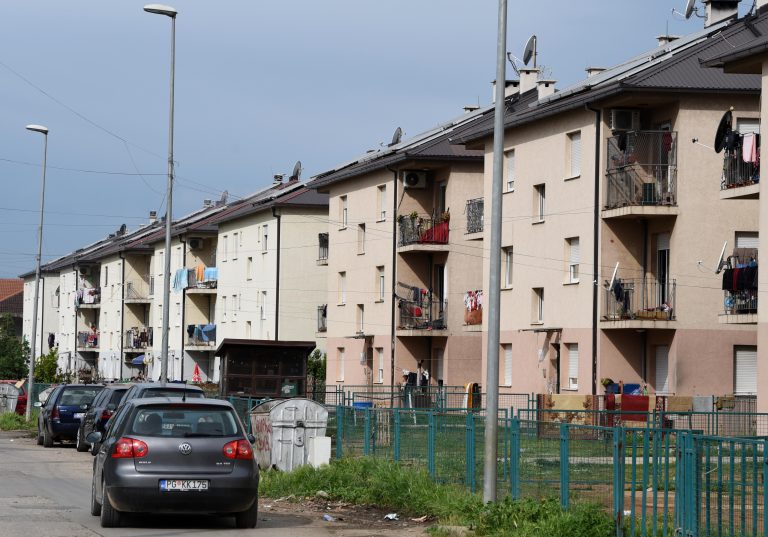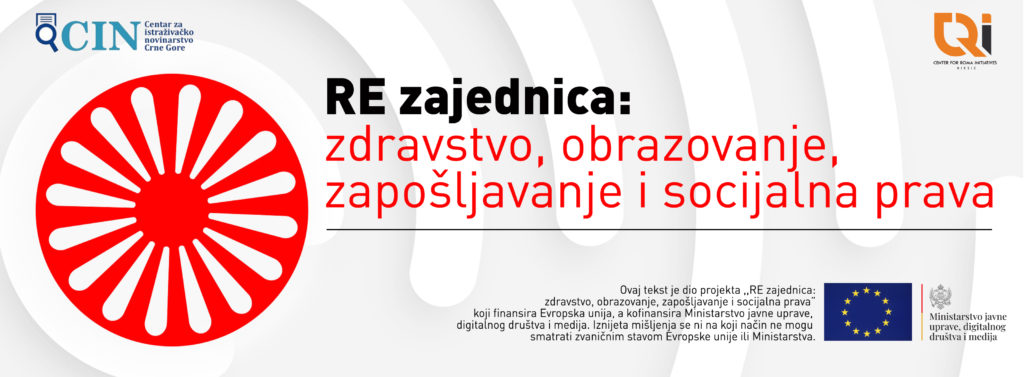FEMALE MEMBERS OF THE ROMA AND EGYPTIAN POPULATION POINT TO NUMEROUS PROBLEMS: ARRANGED MARRIAGE FOR A SEVEN-YEAR-OLD CHILD

MOST OF THE RESPONDENTS (58 PERCENT) THINK THAT LESS KNOWLEDGE IS REQUESTED FROM STUDENTS FROM THE ROMA AND EGYPTIAN COMMUNITY COMPARED TO THE GENERAL POPULATION. SUCH AN APPROACH PUTS THEM IN AN UNFAVORABLE POSITION AND MAKES THEM UNPREPARED - FOR THE LABOR MARKET REGULATION AND FURTHER EDUCATION, THE RESEARCH SHOWS
Due to the prejudices, Roma and Egyptian women face discrimination in Montenegro, starting from healthcare and education to employment; the results of the focus groups conducted for the needs of the Center for Investigative Journalism of Montenegro (CIN-CG) and the Center for Roma Initiatives (CRI) has shown.
"If I don't hear the word Gypsy ten times a day, I find it strange. That's not right. We wait for hours because others skip the line" this is one of the experiences shared by a mediator from a health institution.
The research, conducted by the Center for Monitoring and Research (CeMI), consisted of focus groups with 26 members of the RE community in Podgorica, Nikšić, and Bijelo Polje, three in-depth interviews with mediators, and a survey with 24 mediators.
The quality of primary school education is rated better than pre-school education by the focus group participants - the majority (54.2 percent) consider it to be of good quality.
High school education is rated worse than primary - 35.3 percent. According to the research, it is necessary to investigate further what level of support is missing during this level of education and determine the student's readiness for high school after the end of the previous educational cycle.
The quality of higher education is rated very low, as only a third perceive it as good, and as many as 42 percent perceive it as bad. "It is an important finding that the majority (58 percent) believe teachers require less knowledge from students from the Roma and Egyptian community than the general population. This approach puts students in a disadvantageous position and makes them unprepared - both for the labor market regulations and for further education," the research states.
There is almost a consensus about the need for kindergartens to include mediators who understand the Roma and Albanian languages. This is a typical attitude of 87.5 percent of respondents. The consensus regarding the need for Roma assistants in kindergartens is particularly significant when only 8.3 percent of respondents believe that all children from the Roma and Egyptian community know the Montenegrin language when they enter elementary school.
The majority believe that some children do not know the language used in primary school. The findings state that the coverage of Roma and Egyptian children in pre-school education is still low, and alternative forms of preparation for primary school are also needed.
"When I saw how other children behaved in kindergarten, I started learning the language. Once when the teacher asked me my name, I remember it as if it had happened only yesterday; I couldn't answer her. Instead, since my older brother and sister taught me math - although this was not yet taught in kindergarten - I got up from my chair and wrote 1 + 1 = 2", said one of the focus group participants from Bijelo Polje.
Mediators believe that parents support their children in schooling. Still, not all of them, so it is necessary to additionally strengthen those families that do not recognize the importance of education.
Some parents do not allow their children to go to school, which is not common, but the mediators explained that it happens.
Dropping out of school is caused by many reasons. According to the mediators, the reason is the lack of money - for example, good wardrobes for children, which results in a lower interest of children to continue going to school. The findings show that it is essential to empower parents to motivate their children to continue their education.
"The involvement and empowerment of parents - support in providing material conditions for their children and support to persevere in motivating children to continue to go to school, is an important factor in preventing children from leaving the educational process, that is, the so-called dropout," the finding states.
Access to healthcare
Access to health services is only available with the health insurance card, i.e., a new identity card. The interlocutors and mediators pointed out that the most significant percentage of the population has a health insurance card, but still few don't. There are several reasons for this: missing and incomplete documentation, migration to other countries, neighboring states, or abroad.
The attitude of doctors towards Roma and Egyptian women was assessed as fair. To some extent, it can be explained by the discrimination pointed out by the participants of the qualitative part of the research. They specified, however, that such a relationship is individual and should not be generalized.
The interlocutors from the focus groups stated that they visit the doctor when they have a health problem and rarely go for preventive medical examinations. When it comes to gynecological examinations, interlocutors choose a female gynecologist.
Judging by the mediators, women now equally make decisions about family planning and whether and how many children will be born, which was not the case before.
The focus participants agreed – previously, women did not influence children's birth, but that has changed.
"In the past, a woman was not allowed to make decisions regarding the number of children; she had to have as many children as her husband wanted. However, that was before. Now they both decide", said one of the focus group participants from Nikšić. The respondents also stated that they use contraception.
Arranged marriages and marriage brokers
Based on the statements received, the conclusion is that arranged marriages still exist.
There is awareness of the legal ban on early marriages and the response system established at the community level in case such situations occur. Most interviewees believe that girls are most often married underage, while a fifth of respondents said they most often get married before they reach the age of 16, which is the absolute legal limit. It is worrying that the respondents have heard of very extreme cases of early marriages in the last five years, and they even mention ages 7, 8, 12, and 13...
"Respondents state extremely low lower limits for entering into marriage - as much as eight years. They say that these are well-known cases because there was a reaction from the police, but also that marriages were concluded with children as young as ten years old (they were not reported to the police). They also say that if the police respond and return a girl to her parents, she will return to her husband's family after a few days. In these cases, the motive of the parents to contract child marriage is to provide a good family as a guarantee for a good life and making money.
Marriages are most often arranged by someone from the family (father, mother, or relatives), but also by marriage brokers. The fact that 41.7 percent of the respondents stated that the marriage was arranged by "marriage brokers" requires further analysis. The question arises as to who the mediators are, how they operate, whether it is a planned work...
Most respondents (67 percent) believe that competent institutions are working to prevent arranged marriages between minors. After entering into an underage marriage, the possibilities for continuing education are also limited. This finding is important because marriage is often entered into before or soon after reaching the age of majority. Also, getting married for women means taking care of the household, which is usually an obstacle to finding a job. In marriage, men are usually older than women and holders of property rights.
In the family, male children are sometimes more privileged than female children. Before weddings, prohibitions are imposed on girls, not on boys. The problem is with the parents because they support the male child more than the female child.
Respondents from Podgorica stated that they are not allowed to leave the settlement, visit pubs, or go to the theatre and that they can only go to the cinema accompanied by other family members.
Economic independence does not yet exist
Violence against women is present in general and Roma and Egyptian populations. Nevertheless, most respondents answered that such violence is not current or do not know it exists. Violence against women and girls is still a topic that the Roma and Egyptian population is reluctant to talk about.
Reporting violence is related to the fear of losing contact with children for one's safety and the fear of economic consequences.
The attitude of the police towards women victims of violence is rated by half of the research participants as "neither good nor bad," while 41.7 percent of respondents rated it as good.
"The opinion has been repeated several times that the police react in cases of domestic violence to preserve the usual family structures and that they often try to reconcile family members. Such treatment makes it impossible for the victim to get out of the circle of violence," the findings state, adding that the research participants knew of examples of reported violence against women.
According to this finding, information on the recognition of violence and protection from violence is unavailable in the Roma and Albanian languages. The focus group participants know that in case of violence, the police can be contacted and that there is an SOS phone and a shelter for victims of violence, but they did not know to get these services.
The police, the center for social work, women's organizations, primarily the SOS telephone, and the Safe Women's House can provide such assistance. In Nikšić, the NGO Center for Roma Initiatives actively works on violence cases.
The findings state that it is necessary to educate Roma men and women on how to recognize violence, react if it occurs, and whom they can turn to.
Economic independence, that is, general equality in terms of employment, does not yet exist. The interlocutors' statements indicate that men are the ones who work, i.e., have some form of employment that provides financial resources for the family. Women have this possibility to a small extent. The reason can be found in the general attitude - customs, culture, and mentality that influence women (not) to be employed.
The complete survey is available at the following LINK.
Miloš RUDOVIĆ


